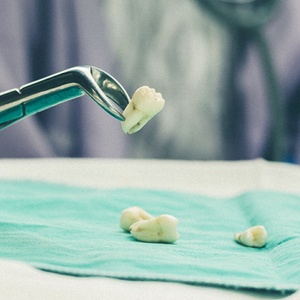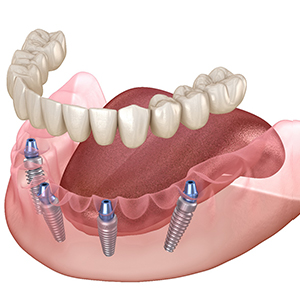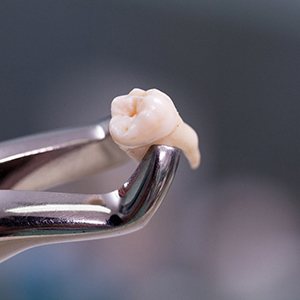Tooth Extractions – Jupiter, FL
Gentle, Comfortable Tooth Removal to Promote Patient Health
Under ideal circumstances, individuals are able to retain all of their natural teeth for a lifetime. In some instances, however, extractions become necessary. If that is true in your case, our experienced oral surgery team is ready to help. We handle extractions with our patients’ comfort and long-term well-being at the forefront of our minds. On this page, we explain some of the possible reasons for extractions and what you can expect from this often-necessary procedure.
Why Choose South Florida Oral and Maxillofacial Surgery for Tooth Extractions?
- Patient comfort is a top priority
- Our experts can handle even complex cases
- Supportive and empathetic team
Do I Need a Tooth Extraction?

Some possible reasons why you might need a tooth extraction include:
- A tooth is too damaged or decayed to be repaired with a filling, crown, or other type of restoration.
- It is necessary to make room in the mouth for orthodontic treatment or dental prosthetics.
- A tooth is impacted (stuck beneath the gum line) and poses a danger to your oral health. This is often true of wisdom teeth.
- The wisdom teeth are not currently causing any problems, but you wish to have them removed as a precautionary measure.
- Gum disease has caused serious damage to the bones that support the teeth.
Types of Tooth Extractions

Most general dentists are able to easily perform simple, single-tooth extractions. We often handle more complex types of extractions, including wisdom teeth extractions and multiple tooth extractions.
Wisdom Teeth Extractions
Removing the wisdom teeth often requires that we make an incision in the gums and/or break the teeth into pieces in order to remove them. Thanks to local anesthetic and available sedation options, you can expect to feel little to nothing during the procedure.
Multiple Tooth Extractions
Trauma, gum disease, or severe overcrowding can all make it necessary for us to remove multiple teeth in a single procedure. We will thoroughly explain our approach to the extractions and make every effort to ensure your comfort. We may also start planning right away to replace your lost teeth with dental implants.
Post-Operative Care
Here are some basic guidelines for caring for yourself in the days after your extractions:
- Take any prescribed medication as instructed, whether it is for pain relief or infection control
- Stick to eating very soft foods
- Do not use a straw
- Do not smoke
- Get an adequate amount of rest
- Maintain good oral hygiene, but do not directly brush the extraction sites
Most patients are able to resume their normal routine within a week or so after their extractions.
Understanding the Cost of Tooth Extractions

If you’re like most people, a tooth extraction is not something you think about the cost of very often. We understand if you may be concerned about what you’ll need to pay following the removal of a tooth, especially if you have several teeth that must be taken out to protect your oral health. While you’re encouraged to ask questions during your appointment, you can also read more about the most influential factors to keep in mind ahead of your surgery.
Factors That Can Affect Tooth Extraction Cost

Until we’ve had the chance to examine your mouth more closely, it’s impossible to know exactly how much your tooth extraction will cost. Some of the most important factors we will consider when creating your treatment plan (and determining your costs along the way) include the following:
- The type of tooth being extracted as well as its location
- How difficult it is to remove your tooth (as oral surgeons, we can perform simple and complex tooth extractions, including removal of teeth that have become impacted or trapped underneath existing teeth or gum tissue).
- The next steps that come after extraction (this could include bone grafting if you plan to receive dental implants later).
Does Dental Insurance Cover Tooth Extractions?

Dental insurance will typically cover tooth extractions to a certain amount because they are considered a major treatment. In most cases, insurance providers will cover around 50% of the cost of tooth extractions. Just remember that there may be limits in place depending on the plan you have. Some plans may only cover a certain number of teeth or come with waiting periods you’ll need to meet before you can receive coverage. Confirm these details with your insurance provider directly before going forward with treatment. Our team will gladly help you confirm the details of your coverage and limitations beforehand.
How to Make Tooth Extractions Affordable

Even if you don’t have dental insurance at this time, there are options to make your tooth extraction more affordable. One of the most common recommendations we make for patients without insurance coverage is CareCredit, a third-party financing solution that allows you to make monthly payments on oral surgery services over a longer period of time. While it depends on the length of the plan you choose, you can often pay little to no interest on your installments. This can make it easier to fit the dental treatments you need into your budget.
Our oral surgeons and team members are ready to assist you however possible, whether it’s explaining the details of your treatment plan to better understand your cost or determine a financing option that makes your care more affordable. Speak with our front desk to learn more about the cost of tooth extractions in Jupiter!
What’s the Recovery for Tooth Extractions Like?

Your experience will depend on a variety of factors, including how many teeth you got extracted. Across the board, however, recovery is largely about resting. That’s why we encourage our patients to stock up on soft foods beforehand, put everything they need within arm’s reach of their couch or bed, and get ready to spend some time catching up on the latest Netflix shows. Of course, we will provide you with detailed aftercare instructions before you leave our office, which includes everything from how often to take your pain medication to which foods you should avoid. After a few days, you should feel exponentially better!
Tooth Extractions FAQs

No one wants to have a tooth extracted, but sometimes it is necessary in order to preserve the health of the rest of your smile. If you’ve been told that you need an extraction, you may still have some unanswered questions, so we’re here to help! Here are the answers to some of the most common questions we receive about tooth extractions in Jupiter. If you don’t see the information that you’re looking for below, give us a call. We’d be happy to walk you through the procedure so that you feel prepared when your procedure rolls around.
Does Getting a Tooth Extracted Hurt?
Many patients are hesitant to commit to treatment because they are worried that the procedure will hurt. Fortunately, the first step of a tooth extraction is always numbing the area with a local anesthetic. While you shouldn’t feel any discomfort during the procedure itself, you will likely feel some soreness for a few days afterward. By following your aftercare instructions closely, you can prevent infection, reduce puffiness, and promote healing. If your pain worsens or you begin showing signs of an infection (like a fever), give us a call so we can help.
Can I Leave the Space Empty After a Tooth Extraction?
If the tooth that you are having pulled is near the back of the mouth, many patients think that they don’t need to have it replaced. After all – no one can see it! The truth is that your teeth do so much more than just create a beautiful smile. They are also essential to chewing properly and enunciating clearly. Missing just one tooth from the back of your mouth can make it difficult to chew, leading to poor nutrition and indigestion. It is recommended that when you are done healing, you schedule an appointment with your dentist to find a tooth replacement option to meet your needs.
Can I Smoke After Getting a Tooth Extracted?
Tobacco products, like cigars, cigarettes, and e-cigarettes, can delay healing, so you shouldn’t smoke immediately following an extraction. It is recommended that you abstain from smoking for at least five days after your procedure. However, if you can, you should avoid smoking for two weeks. If you have had difficulty quitting in the past, don’t hesitate to let us know. This way, we can help you prepare in advance.
What Risks Are Involved with Tooth Extractions?
Tooth extractions are extremely safe. However, any dental procedure comes with some risks. With tooth extractions, the primary risk is infection. Dry socket is another risk that can occur. To prevent these issues from happening, we will provide you with an extensive list of aftercare instructions, as well as a few common symptoms to look out for.
What Can I Do to Speed Up the Healing Time?
It’s important that we start this section by reinforcing how important the healing process is. With that said, if you have a milestone event or something important at work coming up, you naturally might want to expedite the recovery period. The best thing to do in this case is to follow all of your aftercare instructions. That includes keeping your head elevated, avoiding strenuous physical activities, keeping your mouth clean, and sticking to soft foods.
What Are My Options for Replacing a Missing Tooth?
Fortunately, patients today have a wide range of tooth-replacement solutions to pick from, including dental bridges and dentures. However, more than 500,000 people choose dental implants each year because they are custom-made, extremely lifelike, and can last for more than two decades with proper care. Furthermore, they are the only tooth-replacement solution that can stimulate your jawbone, preventing bone loss in the process. Of course, we will review all of your options beforehand so you feel confident deciding what’s best for you.
How Should I Prepare for My Tooth Extraction?
There are a few things we recommend, starting with talking to your oral surgeon directly. They will give you recommendations specific to your treatment, like whether or not you can eat beforehand and if you need a trusted adult to drive you to and from your appointment.
More generally, however, we recommend doing what you can to set yourself up for success. That could include everything from eating a healthy meal the morning of to stocking your pantry and fridge with soft foods for after your procedure.
Is There an Alternative to a Tooth Extraction?
The goal first and foremost is always to save your natural teeth whenever possible. So, if we are recommending having one of your teeth extracted, you can trust that this was not the first treatment we considered. With all of that said, we’d be more than happy to review how we came to this decision if you’re a tad uncertain. That way, you can feel calm and confident heading into your appointment.

